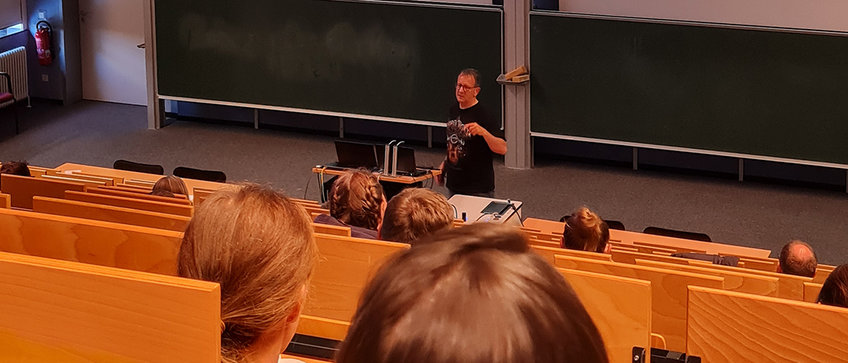
Promotion of Young Scientists
Our work at the Max Planck Institute is based on two major pillars: The first is intensive research activity with a claim to the highest scientific excellence, and the second is the first-class training of young scientists, with outstanding young scientists learning and developing under the best conditions. With us, group leaders are given leadership responsibility for their team and work for several years on their own research area, with all the excellent opportunities that the Max Planck Institute offers. Postdocs from
all over the world conduct research independently or in a team and acquire the qualifications for an independent scientific career. PhD students work under the best conditions and intensive supervision while preparing for their careers in industry, academia, or other positions.
Many of our group leaders habilitate at the University of Potsdam or at one of the Berlin universities, and they teach extensively at these institutions. In addition, the directors and group leaders collaborate in DFG-funded consortia with various universities, for example in Collaborative Research Centers (SFB), graduate schools, research groups, and clusters of excellence. Knowledge acquired at our institute is disseminated to the world and contributes to the development of our research areas. Our Max Planck Institute is highly committed to mentoring young researchers. On average, 25 of our PhD students complete their doctorates each year.
Excellent doctoral training
The institute includes an International Max Planck Research School on Multiscale Bio-Systems, where talented students are given the chance to do their PhD under excellent conditions. For more than 20 years, these English-language graduate schools, IMPRS for short, have been an integral part of the Max Planck Society’s doctoral funding. Common features of the doctoral programs at the Max Planck Institutes are the curricula, which include research seminars and workshops, as well as the close cooperation with universities. Due to its interdisciplinary orientation, the institute works closely with the following universities on doctoral training: the University of Potsdam, Freie Universität Berlin, and the Humboldt University of Berlin. For interdisciplinary research, we offer our doctoral students first-class conditions and excellent equipment.
Outstanding networks
DFG-funded collaborations
Clusters of Excellence funded by the German Research Foundation (DFG) have been established as part of the Excellence Strategy of the German federal and state governments to strengthen top-level university research. They involve scientists from different disciplines and institutions working together on a research project. Directors, group leaders, and PhD students from our institute participate in two interdisciplinary clusters in the Berlin/Potsdam area:
International collaboration
There are a total of 25 Max Planck Centers worldwide, which were founded as a central element of the internationalization strategy of the Max Planck Society. As virtual centers of excellence, they flexibly combine knowledge and methods. Interdisciplinary researchers cooperate with first-class international partners to gain insights in pioneering research areas.
MPQC website: https://research.qut.edu.au/mpqc/


